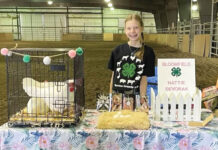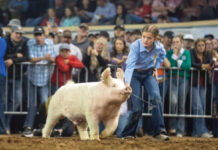
Happy, a red 4-year-old mule, has to be removed from protecting Jo Fantinel’s herd from coyotes after the calves are born because Happy thinks all red calves are her babies.
“I have friends who stress out at work and I always tell them they should have bought a cow,” Jo said.
Imagine being 13-years-old and going into a feed store to order fertilizer and supplies because your father has just passed away.
“People didn’t like talking to a 13-year-old girl ordering fertilizers and supplies,” Jo Fantinel said. “They thought I was just some young kid.”
Jo, an only child, was born in Tontitown, Ark., when her mother was 41 and her father 68. Life without her father was challenging but mother and daughter loved working the land that was originally owned by Jo’s grandfather.
Then the real estate boom hit Northwest Arkansas and urban sprawl started gobbling up farmland. The town decided to become a town rather than a rural community. The other old and established families eventually sold their farms, but the Fantinels wanted to remain. The problem was that real estate agents and land developers were constantly barraging them with unwanted phone calls, offers and helicopters flying over their land, frightening the cattle. Jo’s mother was aging, and the stress finally became unbearable. Unhappily, they sold their land “because it was the only thing that made sense,” Jo explained.
Jo’s mother moved back to her original family homestead while Jo purchased 338 acres for herself and the cattle far off the beaten track in the Clifty area of Huntsville. Urban sprawl was not going to get her again.
“I have been here nine years and the place still doesn’t feel like home but it’s getting easier,” Jo said.
Jo feels fortunate that the farm was in good condition when she bought it from the previous owners, who had just taken cattle off the land. The fencing and cross fencing were in good shape and the farm had seven barns.
“My job was, and is, upkeep,” Jo explained.
An additional reason for selecting this particular property was that the land had two springs she knew of, one of which was a wet weather spring. Nonetheless, she still had to haul in some water during the drought.
On the other hand, the proximity of the War Ealge River provides high humidity and dew even in droughts so she always has green grass.
One problem Jo did face was a 53-acre field infested with thistles.
“My mom used to dig them out or burn them, but my best solution was to broadcast spray to prevent the rest of my farm from becoming infested,” Jo said. Now she only has to spot spray for thistles and for poison hemlock, which seems an area-wide issue.
Jo is a full-time farmer. She has 45 mamas and their babies, in addition to two Charolais bulls. She has another Angus bull that is temporarily at her uncle’s place but will soon be back for breeding.
“I will put the boys out in June,” Jo explained. In regards to “her girls,” Jo considers her mother’s advice: if a cow still walks, she can have a baby.
“Nonetheless, I look at a cow’s bag and back, and if she seems distressed, I will cull her,” Jo said.
Jo walks among her cows daily. The constant attention keeps them both tame and in good health.
“I haven’t had pink eye in two or three years,” she said. Additionally, she has never had to pull any calves nor has she had any prolepses.
Jo works her cattle in the spring, tagging and vaccinating with the ball broad-spectrum vaccination. To keep costs down, she hays her land and usually does the raking while her uncle and cousin do the mowing and baling. Jo said, “I couldn’t farm without their help with the hard stuff.”
Jo supplements her income by leasing some of her land and by designing and selling her own line of jewelry.
As she looks toward the future, Jo is hoping to someday have a community support agriculture (CSA) farm with pigs, both dairy and meat goats, sheep, rabbits and a greenhouse for vegetables. Her father had kept many of these animals and she feels a call to replicate much of what he did since she couldn’t keep his land.







